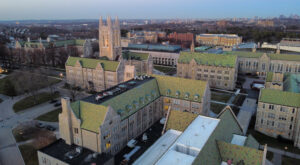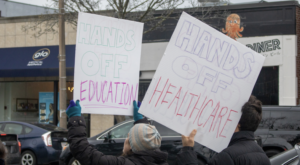Republican nominee Donald Trump will be the next president of the United States. Early Wednesday morning, Trump won the electoral contest with an unexpected victory over his Democratic challenger, Hillary Clinton. President-elect Trump carried many of the states that had voted for President Barack Obama in both 2008 and 2012. One of the most significant aspects of his victory was the support he received from all areas of the country in states he was not expected to carry.
This election cycle, one characterized by constant scandal and incessant controversy, came to an end with a result that was at odds with the predictions of the majority of news outlets and pollsters. Before the polls began to close, The New York Times predicted that Clinton had a 70 percent chance of claiming the election, a number that was quickly disproved by the vast support Trump enjoyed throughout the night, especially in states such as Pennsylvania and Florida, where he claimed important victories. While Trump obtained the necesary electoral votes to claim the election, Clinton claimed a higher percentage of the popular vote, in a situation similar to Al Gore’s defeat in 2000. The Republican party also claimed a majority in both the House and the Senate.
Clinton carried Massachusetts with 60 percent of the vote. Turnout for this election in the state surpassed that of 2012 and 2008, especially early voting, according to staff at the 5th ward polling center at the Boston Public Library. The state was called as soon as the polls closed.

Two Massachusetts ballot questions did not pass, and two did. Question 1, which would allow a second slots site, and Question 2, which would raise the statewide cap on charter schools, were defeated despite support from high-profile political figures such as Gov. Charlie Baker, a Republican. Question 3, which prohibits farm animal confinement, and Question 4, which legalizes the use of recreational marijuana for people 21 and over, passed overwhelmingly. By approving the latter, the state joins others like Colorado, which approved it in 2014, and California, which also approved its use tonight, as part of a growing coalition of states that have legalized marijuana.
On campus, the Eagle Political Society (EPS) held an election results viewing event in the Vanderslice Cabaret Room until 1 a.m. Students at the event engaged in political discussion as the results came in. A recent survey of Boston College students conducted by The Heights found that 75 percent of respondents intended to vote for Hillary Clinton, compared to 8.4 percent who indicated that they supported Trump.
Luis Cardenas, MCAS ’18 voted at Alexander Hamilton Elementary School in Brighton, Mass. Cardenas voted for Clinton because he was offended by Trump’s comments about Mexicans and immigration, as his hometown is along the border between the United States and Mexico.
“I voted for Trump solely because my family has worked very hard for everything that it has earned.”
—Chloe Kargodorian, CSOM ’19
Cardenas believes that the U.S. economy benefits from being close to the Mexican border because of trade deals like the North American Free Trade Agreement, which accounts for about 14 million U.S. jobs. He disagrees with Trump’s belief that a wall should be built along the border. Cardenas felt that it was disrespectful to his family and his culture and believes that Clinton is the most qualified candidate.
Chloe Kargodorian, CSOM ’19, is from California, where taxes are relatively high. She voted for Trump because she feels as though he would ensure her taxes go to a productive cause.
“I voted for Trump solely because my family has worked very hard for everything that it has earned,” Kargodian said. “My dad worked really hard to get into dental school, make a living for himself, and to establish his own practice.”
Anthony Masi, CSOM ’19, voted in favor of a third-party candidate who felt that voting for Trump or Clinton went against his morals. He believed that Clinton would provide the most economic stability, but that she could not unify the country.
During the months leading up to the election, various organizations and academic departments at BC hosted speakers with experience in politics and government who have commented on the election. In October, the Council for Women of Boston College hosted a panel that featured Mary Matalin, a campaign director for former President George H. W. Bush, and Donna Brazile, the interim chair of the Democratic National Committee. The discussion focused on the role women in political leadership, although both panelists expressed their thoughts on the presidential race.
More recently, the Winston Center for Leadership and Ethics invited former Attorney General Eric Holder to speak at its fall 2016 Clough Colloquium. Holder emphasized the need for the creation of a new Voting Rights Act with the aim of protecting voters from rigid Voter I.D. laws that have recently been passed in many states. The EPS also hosted screenings of the presidential and vice presidential debates in an effort to encourage students to become informed on the two major-party candidates in the race.
All students at Boston College have access to TurboVote, an online application that helps students register to vote, apply for absentee ballots, and remain informed on local and national elections. Additionally, the Office of Student Affairs offered students rides to polling locations in the Boston area during Election Day. Students from out of state with absentee ballots had the chance to have their ballots notarized at Lyons Hall on Oct. 19th and 25th.
Featured Image by Savanna Kiefer / Heights Editor
Updated: 1:56 p.m.





You must be logged in to post a comment.